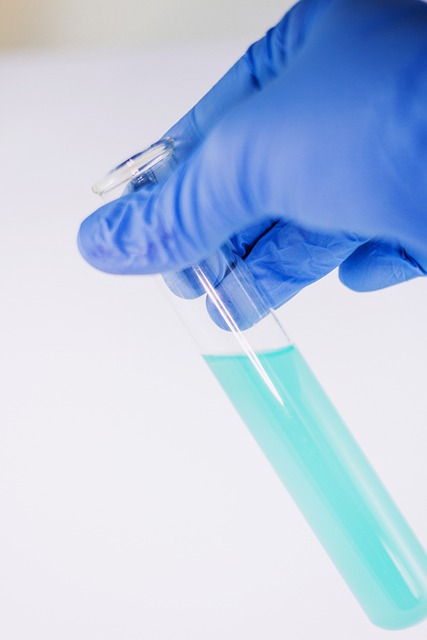Regular monitoring of the thyroid gland is essential in the UK, utilizing standard thyroid examination kits like the UK General Health Blood Test to detect disorders early. This test measures key hormones (T3, T4, TSH) crucial for diagnosing and managing thyroid health. Interpreting these results requires understanding reference ranges (0.4-4.0 mU/L for TSH, 10-25 pmol/L for FT4, 1.3-4.2 pmol/L for T3), with variations between labs. Timely intervention based on these tests improves patients' overall health and quality of life.
In the pursuit of maintaining optimal UK general health, regular thyroid examinations are essential. The thyroid, a small gland with a significant impact on overall well-being, requires routine checks for potential issues. This article explores the significance of such assessments and introduces the standard thyroid examination kit used in the UK.
We’ll guide you through the process, from understanding thyroid health to interpreting blood test results, ensuring you’re equipped with knowledge about this crucial aspect of your wellness.
- Understanding Thyroid Health: Why UK Patients Need Regular Checks
- Unpacking the Standard Thyroid Examination Kit for Comprehensive Testing
- Interpreting Results: What Do Your Thyroid Blood Test Figures Mean?
Understanding Thyroid Health: Why UK Patients Need Regular Checks
The thyroid gland, often referred to as the “gland that controls your metabolism,” plays a pivotal role in maintaining overall health and well-being. Located at the base of the neck, it produces hormones that regulate numerous bodily functions, including energy production, growth, and development. Understanding thyroid health is essential for UK patients because an underactive or overactive thyroid can lead to a range of symptoms affecting every aspect of life, from weight fluctuations to fatigue and cardiovascular issues.
Regular checks through standard thyroid examination kits are crucial for early detection of thyroid disorders, such as hypothyroidism or hyperthyroidism. The UK General Health Blood Test includes key markers like TSH (Thyroid-Stimulating Hormone) levels, which provide valuable insights into thyroid function. By incorporating these routine tests into their healthcare regimen, UK patients can ensure timely intervention and management, thereby enhancing their quality of life.
Unpacking the Standard Thyroid Examination Kit for Comprehensive Testing
Unpacking a Standard Thyroid Examination Kit reveals a comprehensive set of tools designed to provide a thorough assessment of thyroid function. This kit, tailored for UK patients, includes a range of components essential for accurate diagnosis and monitoring. At its core, it offers a UK General Health Blood Test, which measures key markers such as T3, T4, and TSH (Thyroid-Stimulating Hormone). These hormones play pivotal roles in regulating metabolism, making the test crucial for evaluating thyroid health.
The kit may also include instructions, vials for blood collection, and pre-paid return envelopes, ensuring a seamless experience from start to finish. Proper use of these tools allows healthcare professionals to gain valuable insights into a patient’s thyroid status, enabling them to make informed decisions about treatment and management strategies.
Interpreting Results: What Do Your Thyroid Blood Test Figures Mean?
When interpreting results from a UK general health blood test for thyroid function, understanding what each figure represents is key. Thyroid stimulating hormone (TSH) levels typically range between 0.4 and 4.0 mU/L (milliuunits per litre). A TSH level within this reference range generally indicates that your thyroid gland is functioning normally. However, values outside this range may suggest underlying issues. For example, a high TSH could signal hypothyroidism, where the thyroid doesn’t produce enough hormones, while a low TSH might indicate hyperthyroidism, where it produces too much.
Thyroid hormone levels, namely free thyroxine (FT4) and triiodothyronine (T3), are also measured. FT4 usually ranges from 10 to 25 pmol/L (picomoles per litre), with values at the lower end potentially indicating hypothyroidism. T3 levels typically fall between 1.3 and 4.2 pmol/L, and a low reading could suggest similar thyroid dysfunction as FT4. It’s important to remember that these reference ranges may vary slightly between laboratories, so discussing your results with a healthcare professional is essential for accurate interpretation in the context of your individual health profile.
In light of the importance of thyroid health for overall UK general health, equipping patients with a standard thyroid examination kit offers a convenient and comprehensive solution. By regularly monitoring thyroid function through blood tests, individuals can ensure early detection of any imbalances, allowing for prompt treatment and management. This simple yet powerful tool empowers UK patients to take an active role in their healthcare, ultimately contributing to improved outcomes and enhanced well-being.
